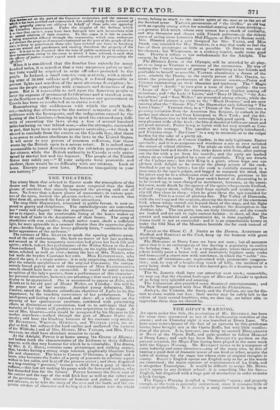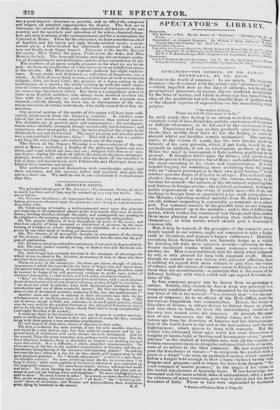THE GIPSY'S WARNING.
AN opera under this title, the production of Mr. Besenicr, has been for seine time announced as one of the forthcoming noveltiee of the season ; and on Thursday eight it was launched at Drury Lane. We have sonic remembrance of the fact of an operetta by this gentleman having been brought out at the Opera Buffa, but very little recollec- tion of the piece. It is, however, one thing to succeed MF.IICADANTE or Ricci at the Opera Buffa, and quite another to follow MOZART at Drury Lane ; and such has been Mr. BENEDICT'S position on the present occasion, the Magic Flute having been played in the same week with the Gipsy's Warning. Mr. BENEDICT seen's to be a composer of some industry and some cleverness--one of the many who, by dint of hearing a good deal of dramatic music of one kind or other, acquire the habit of writing for the stage, but whose store of original thoughts is scanty. BALFE.S English operas are English only as far as the words are concerned ; the music consists of reminisceloces of La Scala, and is altogether Transalpine. It would be difficult to assign Mr. BENE. DICT's opera to any distinct school : it is something like his face— English, but disguised with a huge pair of mustachios in order to make it look foreign.
The Gipsy's Warning is called a "romantic" opera; and properly enough, as the nem is generally understood, since it contains little of eature or probability. It is merely a story contrived to bring in as
mat y good musical situations as possible, and to rafted the composer and singers all practical opportunities for display. The first act in Germany, the second in Italy—the superstitions and horrors of the one country, and the spectacle and splendour of the other—haunted cham- bers and men in armour at the commencement, and for a termination the Carnival at Rome. Then for the characters, we have a murderous chief of banditti, and his trusty and right bloody-minded squire, a senti- mental gipsy, a false-hearted but afterwards repentant duke, and a hue and finally nude-happy damsel. PHILLIPS is the bandit, SEGUIN the squire, Miss POOLE the gipsy, TEMPLETON the duke, and Miss ROMER the lady. The hero and heroine undergo the customary probe- toll of disappointment and misfortune, and are at last rewarded as of old. The overture of en opera usually prepares us for what we are to ex. pect : we have no recollection of u fine overture to an indifferent opera, or the reverse. Mr. BENEDICT'S overture induced but slight expecta- tions. It Was crude and disjointed—a collection of fragments, not a whole. A little of every thing in turn,—a few bars of reed instruments obligati ; ditto for brass ditto; the promise of a fugue ending in the performance of a march ; the whole winding up with the usual explo- sion of 0.rums, cymbals, ti iangles, and other musical instruments, as they are now-a- days facetiously called. But there is a sympathetic power in noise to an English audience, who always seem resolved to enter the lists with the orchestra on such occasions ; and the overture was encored,—chiefly though, we must say, in consequence of the stre- nuous exertions of certain individuals, who richly earned their free ad- missions.
Our general opinion of the merits of this opera will have been suffi-
ciently coejectured from the foregoing remarks. It exhibits some talent, but not much—more acquired cleverness than natural power. The melodies are in general poor and commonplace ; the accompani- ments often skilfully arranged, though occasionally too boisterous, and sometimes, most improperly, where the story required the singer to be distinctly heard and understood. The most pleasing and popular piece Was a (so-entitled) " Student's Glee." This will sell ; but we neither read long life nor a large sale written upon any of the songs.
The climax of the Gipsy's Warning is a representation of the car- nival at Rome ; including a display of the grotesque figures one sees there, and some which one does not see ; mingled with dances of vari- ous device : during the whole of which, the story of the piece, accommo
&tingly, stands ; and the ruffian who has made all the mischief is left at large and unmurdered, until Pulchinellu and Harlequin have ex- hibited their tumbles and jumps.
The performers excited themselves with considerable spirit ; and their exertions, and the scenery, ballet, and spectacle may give the opera a short run. We Shall be out in our calculation it' it reach more than this.























 Previous page
Previous page